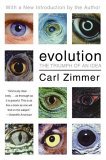Over the past few days various people have noted, in the blogsphere and in my email inbox, the latest USA TODAY/Gallup Poll results pertaining to Americans' views on Evolution vs. Creationism. The main results, as summarized (below) by John Lynch, are causing much understandable despair among science bloggers and friends:
- "Evolution, that is, the idea that human beings developed over millions of years from less advanced forms of life" is probably or definitely false: 44%
- "Creationism, that is, the idea that God created human beings pretty much in their present form at one time within the last 10,000 years" is probably or definitely true: 66%
- 15% said that they would be more likely to vote for a candidate that did not believe in evolution.
First, what to make of the 82% of those polled who claimed that they were familiar (41% very familiar) with evolution, or the 86% that said the same (50% very familiar) about creationism? I think these numbers reflect, in part, the average person's wish to not appear ignorant with a pollster, some (considerable?) hubris about how much they truly do understand, and, perhaps most importantly, our failure as educators in making people able to see the difference! This may be another sign of how ignorant/deluded much of the country is about science - and how much our work is cut out.
At the same time, however, I'm uncomfortable with calling the masses asses, because that is the kind of "framing" likely to make them turn away from rather than towards scientists for knowledge. I'm more inclined to wonder about the poll's sample size and methodology - but note the widespread acceptance of similar Gallup polls by a variety of people across the political spectrum; would they be able to continue publishing similar poll results if the methodology was as egregiously wrong as Laelaps suggests? Perhaps I am being naive on that point, but I do have to question the design of the poll questions which seek separate responses for evolution and creationism (of the Young Earth variety, i.e., YEC) given that 53% accept Evolution, while 66% accept YEC - why not make it a binary choice between the two notions? As it is, it seems clear that a lot of people are quite capable of simultaneously believing multiple contradictory ideas without their heads exploding! Sounds like some students I know...













3 comments:
Fresno evolving,
You might find our article on the inadequacy of the Gallup Poll questions of interest.
http://www.christianfaithandreason.com/june_evolutionpoll.html
Thank you for the links; personally I think such numbers persist (and are considered "accurate") because they are useful as labels. In this case in particular, the people who think "the masses are asses" believe it reflects that state of things, and some fundamentalists will be heartened by the visibility of creationism, so why question the numbers? All the survey showed was that 1,007 people thought such and such about evolution, but all to often I find the response is "66% of Americans think this is so" when there's nothing to show that's true.
Anyway, I too was a bit disturbed by the responses regarding understanding of evolution and creationism; bio 101 in high school or reading Behe's latest book doesn't mean you have a good comprehension of evolutionary science (or creationism), and the questions lie entirely on the subjects own impression of themselves and their knowledge. I'm not ignoring the fact that there are many fundamentalist religious folk in society these days, but I don't think a handful of questions posed to 1,007 people can really give us a good idea of what is really going on. Thanks again, and keep up the good work.
Most people think they know evolution because they've heard the word, and most think (from my experience teaching students) that it means "humans evolved from apes or monkeys" (not the correct answer of common ancestry, and rarely relating to species other than humans). They don't know the complexities of it but they know the surface so that's why they answer yes, I suspect...
Post a Comment